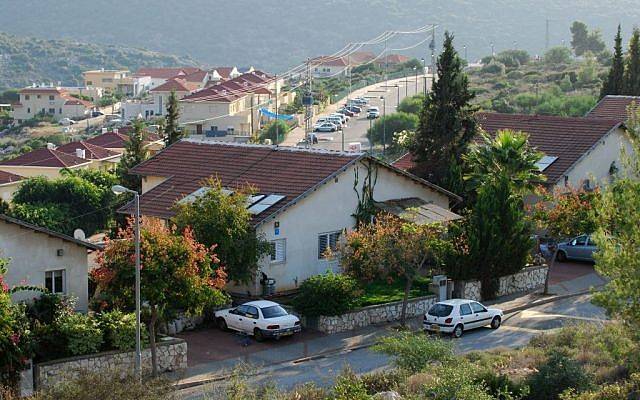Cabinet reduces red tape as Minister Bezalel Smotrich gets promised authority.
By Josh Hasten, JNS
Supporters of Jewish communities in Judea and Samaria had double cause for celebration this week.
On Sunday, Prime Minister Benjamin Netanyahu announced during the Cabinet meeting a decision to make it easier to obtain permits to build inside Jewish communities in Judea and Samaria.
At the same, it was announced that the Civil Administration’s Higher Planning Committee is set to meet on June 26, in order to approve 4,560 new housing units in communities throughout the region.
The Cabinet also transferred most of the authority to approve such construction to Finance Minister Bezalel Smotrich, who also serves as a minister in the Defense Ministry and thus plays an important role in overseeing civilian life in Judea and Samaria via the latter ministry’s Civil Administration.
Construction boom
“The construction boom in Judea and Samaria and in all parts of our country continues. As we promised, today we are advancing the construction of thousands more new units in Judea and Samaria,” Smotrich said Sunday.
“Judea and Samaria residents cease to be second-class citizens and the natural development in settlements is reflected in construction and expansion,” he added.
In February, Netanyahu, Defense Minister Yoav Gallant and Smotrich signed a document of understanding regarding the division of responsibility in the Defense Ministry.
According to a joint statement at the time, the document, which was not made public, outlines respective authorities over the Civil Administration and the Coordinator of Government Activities in the Territories, pursuant to the coalition agreements.
Netanyahu had promised Smotrich that he would immediately transfer to him power over the Civil Administration, which is responsible for approving construction and handling other bureaucratic matters in Area C of Judea and Samaria.
Sunday’s Cabinet resolution came as an amendment to a 1996 government decision requiring the defense minister to approve intermediate steps of the process of planning and construction. Now, only initial approval for projects will be required and there is no clear mechanism in place for senior Israeli officials to put the brakes on an initiative.
The Cabinet decision came as U.S. Assistant Secretary of State for Near Eastern Affairs Barbara Leaf arrived in Israel for meetings.
Smotrich took to Twitter to publish a screenshot of the planning committee’s agenda indicating where the new homes would be built.
A statement released by his office provided some of the details including “hundreds of units in [the communities of] Neve Tzuf [aka Halamish] and Eli, along with hundreds of units in Givat Ze’ev and Beitar Illit, 340 units in Ma’ale Adumim, 381 in Revava, 343 in Elkana, 287 in Adora and 196 in Telem.”
The “new units join the nearly 10,000 units publicized during the previous Higher Planning Committee Meeting … and represent the highest number of approvals in the scope of construction in Judea and Samaria, over the past decade,” the statement continued.
The Yesha Council
Shlomo Ne’eman, head of the Gush Etzion Regional Council and chairman of the Yesha Council, released a video statement sharing his excitement over both announcements.
“The people have chosen to continue building in Judea and Samaria and the Jordan Valley, and that is the way it should be,” Ne’eman said. After the previous government froze the building of thousands of housing units, there is an essential need to restore the succession of work, as was done over the past decade.
“We welcome the publication of the agenda, which includes the approval of hundreds of important housing units in Gush Etzion, Binyamin, Samaria, Elkana, Givat Ze’ev and the cities of Ariel, Ma’ale Adumim and Beitar Illit, which have waited and have required building approval for a long time already,” he continued.
“Likewise, the amendment of resolution 150 [the Higher Planning Council document that details the necessary requirements for building approvals in Judea and Samaria] allows for the planning and building process to make headway in a professional manner, as appropriate and customary for every other part of Israel….
“The Yesha Council will continue to work with the ministers and planning entities in order to continue the construction work in Judea and Samaria,” Ne’eman said.
Smotrich calling the shots
A senior representative for the communities in Judea and Samaria explained to JNS how the amendment to resolution 150 would remove governmental hurdles, making approvals easier.
She said, “Until now, Israel’s defense minister would have to grant the overall approval on a construction plan as it went through the various approval phases. In the previous government, for example, even if the Higher Planning Committee would validate a project, at the end of the day [then-Defense] Minister Benny Gantz would refuse to sign, and construction would be held up.”
With Smotrich now calling the shots, he will be able to approve projects without waiting for a defense minister who may be less willing to do so.
In the past, defense ministers and prime ministers have intervened to slow construction or deny building permits in Judea and Samaria due to international pressure, primarily from Washington, or for other political reasons.
Brig. Gen. (res.) Amir Avivi, founder of the Israel Defense and Security Forum (IDSF), told JNS that he welcomed the decision of the government of Israel to reduce red tape. He added that he supported the announced housing units.
“Jewish construction in the heartland of Israel provides security for the entire State of Israel. There is no substitute for an Israeli presence in the mountains overlooking Israel’s major population centers while at the same time the IDF has the operational ability to combat terror within Area A [where the Palestinian Authority’s cities are located] thanks to a strong Jewish presence throughout Judea and Samaria,” said Avivi.
